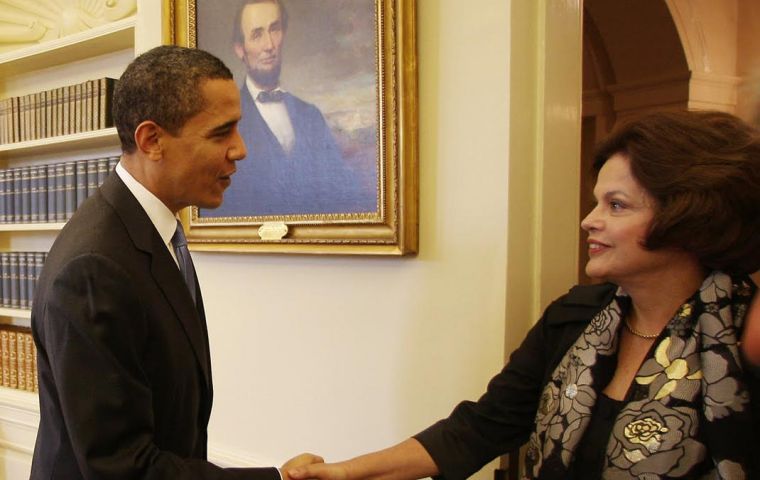MercoPress. South Atlantic News Agency
Rousseff and Obama to discuss ways to counteract China’s undervalued Yuan
 US president Obama is scheduled to visit Brazil next March
US president Obama is scheduled to visit Brazil next March Brazilian President Dilma Rousseff will discuss with her U.S. counterpart Barack Obama ways to counteract the threat posed by an undervalued Yuan and cheap imports from China, a Brazilian official said.
China's policy of undervaluing the Yuan will be discussed when Obama travels to Brazil next month for his first meeting with Rousseff since she took office Jan. 1, said the official, who is not authorized to speak publicly on the matter.
Rousseff, who will visit China in April, created a task force comprised of trade officials, diplomats, businessmen and outside experts to suggest policies to cope with rising Chinese imports. Among the options is a multilateral agreement between China and Latin American nations to boost manufacturing exports to the world's second-largest economy, said the official.
Chinese exports to Brazil rose 61% last year to 25.6 billion as a 34% rally by the Real against the Yuan since the start of 2009 lowered the cost of imports. The U.S. trade deficit with China soared 21% to 252 billion in the January-November period last year. China overtook the U.S. as Brazil's biggest trading partner in 2009, as demand for the South American country's iron ore and soybeans surged.
A survey by Brazil's National Industrial Confederation published this week shows that one out of four manufacturers face competition from Chinese goods in the local market. In that group, 45% lost market share to Chinese imports, the survey of 1,529 companies, taken Oct. 4 to Oct. 19, showed.
U.S. Treasury Secretary Timothy F. Geithner will discuss bilateral and Group of 20 issues with senior Brazilian officials on Feb. 7 in his first visit to Brazil since taking office in 2009, the Treasury Department said.
Global trade rules under the auspices of the World Trade Organization are powerless for dealing with the competitive edge provided by China's currency policy, the official said. Brazil's decision last year to raise tariffs on Chinese-made toys to 35%, the maximum under provisions of the Geneva-based WTO, from 20% hasn't helped local toymakers, the official said.
Rousseff has signaled she wants to work more closely with the U.S. than did her predecessor Lula da Silva. On Dec. 2, she told Washington Post columnist Lally Weymouth she has “great admiration” for Obama, and in her inaugural speech to Congress said she hopes to “deepen” ties with the U.S.
Obama said during his State of the Union address last month that he will visit Brazil as part of his first-ever tour to South America. He's also visiting Chile and El Salvador.
The dollar has weakened 3.5% against the Chinese currency over the last two years while Brazil’s Real gained 39% against the dollar in the same period.
Rousseff plans to make China's trade and currency policies a “priority” in bilateral relations between the two countries, Trade Minister Fernando Pimentel advanced last month and Marco Aurelio Garcia the president’s special advisor for foreign policy said Rousseff is as concerned about China's attempts to keep the Yuan undervalued as she is about the weak dollar.




Top Comments
Disclaimer & comment rules-

-

-

Read all commentsWow is USA stabbing China in the back again, did USA forget that China can devalue the U$ anytime they wish ?? Obama better be carefull on the words he uses to create the wedge between Brazil and China, Chances are that Brazil and China have no need for the bad heat USA is blowing, it would be a good advice to stay as far away from USA as we can, Egypt didn't do it and look what's happening in Egypt.
Feb 04th, 2011 - 10:35 pm 0oh, it sounds like a declaration of war haha I hope Dilma will keep an eye open, these deceivers are bloody trators when it comes to business.
Feb 04th, 2011 - 11:42 pm 0Obama ao ritmo do samba
http://www.youtube.com/watch?v=IHKl63d-TfM
@I
Feb 05th, 2011 - 12:38 am 0Brazil is actively seeking US help. Without the US, Brazil can do nothing against China but to lift import tariffs. Still, IMO, with or without the US, the chances that China will give in to international pressure are null. Instead of worrying about other countries' currencies, Brazil should devalue its own. Apparently it'll not do so for the government is too chicken to do something against foreign “investors” who are speculating with the Brazilian currency. Frankly, I already repent having voted for Dilma. Serra at least had was clear that he intended to devalue the real and reduce interests rates. Brazil will probably have a balance of payments crisis soon. I hope that, after that, the government will have the guts to no longer acquiesce to the whims of unproductive speculators.
Commenting for this story is now closed.
If you have a Facebook account, become a fan and comment on our Facebook Page!